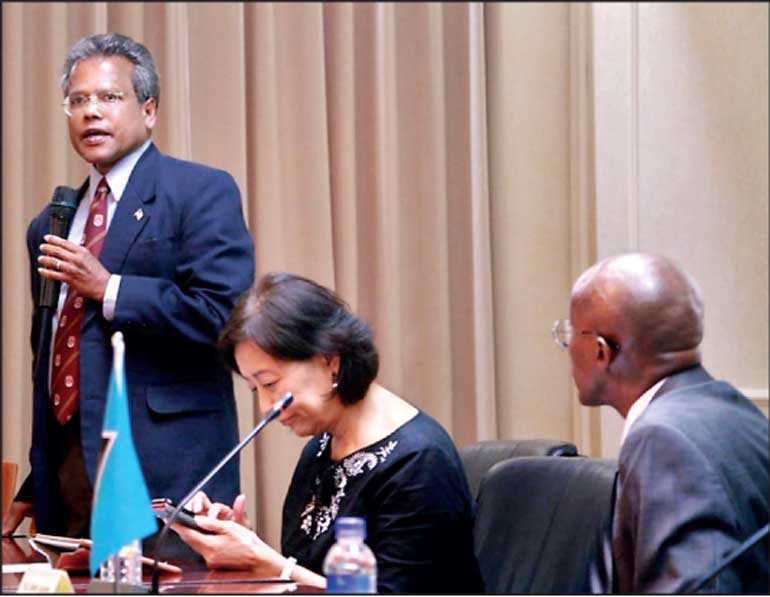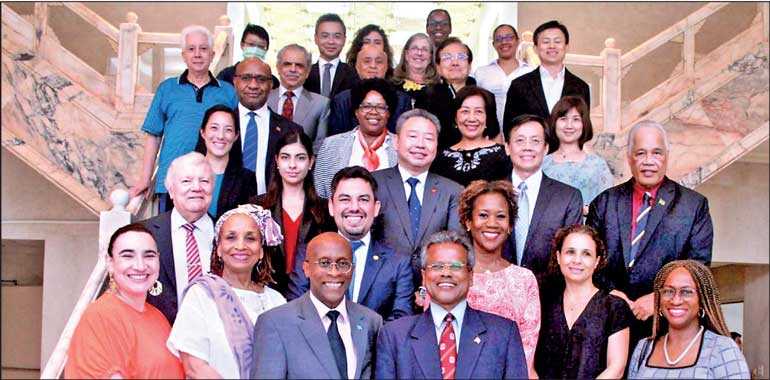Friday Feb 27, 2026
Friday Feb 27, 2026
Saturday, 15 August 2020 00:11 - - {{hitsCtrl.values.hits}}

Professor Patrick Mendis (left) speaking at the roundtable discussion after Ambassador Edwin Laurent (right) welcomed other diplomatic envoys, trade representatives, and government officials at the Diplomatic Compound in Taipei (Photo courtesy of Embassy of St. Lucia)
Ambassador Laurent and Professor Mendis with other leading diplomats and expert participants from various backgrounds and regions of the world (Photo courtesy of Embassy of St. Lucia)
By Emerson De-Yi Zhou
Taipei: As trade war and the South China Sea tensions between Washington and Beijing are intensifying amid COVID-19, the ‘American betrayal’ in 1919 at the Paris Conference in Versailles is still in the minds of Chinese leaders, said Sri Lanka-born former US diplomat Dr. Patrick Mendis in his keynote address at a roundtable discussion organised by the Embassy of St. Lucia in Taiwan.
Dr. Mendis – who served as an American diplomat and a military professor in the NATO and the Pacific Commands during the Clinton, Bush, and Obama administrations – is a Taiwan fellow of the Ministry of Foreign Affairs and a distinguished visiting professor of global studies at the National Chengchi University as well as a senior fellow of the Taiwan Center for Security Studies in Taipei.
Ambassador Edwin Laurent of St. Lucia welcomed the panellists and other participants for the speech titled “Could the Chinese Initiatives and the US Strategies ‘Make the World Safe for Democracy’ in a Post COVID-19 Era?”
To better understand the rapidly changing perilous scenarios between President Xi Jinping’s ‘China Dream’ and President Donald Trump’s ‘America First’ policies and ‘Indo-Pacific strategy’, we must return to history, said Professor Mendis. By quoting British Prime Minister Winston Churchill, the professor began his talk, saying, “The farther backward you can look, the farther forward you can see.”
Revealing Beijing’s mindset in its “national rejuvenation of Chinese culture and China Dream,” Professor Mendis said that the underlying meaning of President Xi’s “Belt and Road Initiative (BRI) represents the combination of the Cosmopolitan China of the Tang Dynasty (618-907) and the Maritime Supremacy of the Ming Dynasty (1368-1644) with Chinese characteristics” to create a commercial civilisation.
Inspired by China, the Founding Fathers of the US wanted to build a “commercial republic” modelling after ancient China, explained Professor Mendis.
At the post-WWI Paris Peace Conference, however, US-China relations changed forever after Shandong province – a German concession captured by Japan during WWI – was handed over to Tokyo rather than to China. This American betrayal gave birth to the May Fourth Movement that was championed by Luo Jialun and his fellow Peking University student-leaders at the Tiananmen Square in 1919. These leaders campaigned for removing traditional values and “Mr. Confucius” and adopting Western values called “Mr. Science” and “Mr. Democracy,” said Professor Mendis.
Emphasising Luo Jialun, who was later appointed as the first ambassador to India by President Chiang Kai-shek of the Republic of China in 1947, the American diplomat said that Taiwan kept the “May Fourth Spirit” of science and democracy alive in dealing successfully with COVID-19 when China failed to control the spread of the coronavirus with its lack of openness and transparency while America failed its functioning democracy due to its lack of capacity to trust in science over President Trump’s anti-science ideology.
Regarding the value of science and democracy during the COVID-19 challenge, both Washington and Beijing can learn from Taiwan, Professor Mendis told the audience of foreign envoys and business representatives around the world.
(The writer is a graduate student in the diplomacy program at the National Chengchi University and a former intern at the Department of North American Affairs of the Ministry of Foreign Affairs, Republic of China.)